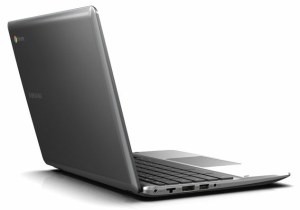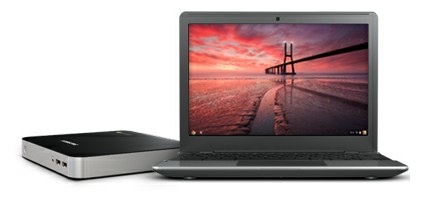The first generation of Google’s Chromebooks worked fine, but few people would have ever described these browser-centric laptops as excellent. Sure, they had some great features, including long battery life and very fast boot-up times, but they never caught on with consumers. For the most part then, they were relegated to being used in schools, libraries and Google’s own campuses (which isn’t necessarily a bad thing). I’m not sure the latest Chromebook, the Samsung Series 5 550 will change that, but it’s a much improved version of Samsung’s earlier ChromeOS effort and thanks to some changes in ChromeOS, it’s now actually a very usable laptop replacement if you are one of the few people who can live without using desktop software.
Google provided me with a new Chromebook (as well as its desktop version, the Chromebox) and after using it extensively at local coffee shops and during a recent trip, I was surprised at how useful these little machines can be. Indeed, if all of your work happens on the Web, both the Chromebook and the Chromebox are now perfectly adequate for getting work done. Given what we’ve come to expect from our laptops and desktops, though, Google’s machines still feel limited. The fact that this is even something worth discussing, though, is a testament to how quickly the web has evolved over the last few years and how much we now can do without needing old-school desktop software.
Much Improved
 Nobody ever accused the first-generation of Google’s laptops of being speedy. The first thing you will notice when you boot up the new Chromebook, however, is how much faster everything now feels. Thanks to switching from an Intel Atom processor to a dual-core Intel Celeron processor running at 1.3GHz and bumping the on-board RAM up from 2GB to 4GB, websites now render much faster than before and the whole systems feels significantly more responsive. The specs, of course, don’t look very impressive on paper, but thanks to ChromeOS being a very efficient operating system, you quickly forget to even think about the specs after using the Chromebook for a few hours.
Nobody ever accused the first-generation of Google’s laptops of being speedy. The first thing you will notice when you boot up the new Chromebook, however, is how much faster everything now feels. Thanks to switching from an Intel Atom processor to a dual-core Intel Celeron processor running at 1.3GHz and bumping the on-board RAM up from 2GB to 4GB, websites now render much faster than before and the whole systems feels significantly more responsive. The specs, of course, don’t look very impressive on paper, but thanks to ChromeOS being a very efficient operating system, you quickly forget to even think about the specs after using the Chromebook for a few hours.
Given that ChromeOS now features a more Windows-like window manager, some of that extra computing power is diverted to rendering the new user interface, but the browser-centric vision of ChromeOS still remains intact. The difference now, though, is that you can have multiple browser and web app windows open simultaneously instead of being relegated to just using lots of tabs. ChromeOS now also features a more traditional taskbar at the bottom of the screen that lets you pin and launch your most frequently used sites and apps.
Working offline, of course, isn’t a strong suite for any ChromeOS device. That’s slowly changing, now that Google offers a Chrome plugin to use Gmail offline, for example. You can also read your Google docs offline these days, but you can’t edit them, which makes getting stuff done a bit hard when you’re on a plane without WiFi, for example. A more comprehensive offline mode for Google Docs/Drive will likely arrive in the next few weeks, though.
 With the new Chromebox, which features pretty similar specs, it’s obvious that Google is now trying to branch out from its more education-centric approach and is making a stronger push into the enterprise and retail markets. I spent some time with the Chromebox ($329) over the last few days and it basically feels just as responsive as its laptop-sized brethren. The hardware looks very similar to a Mac Mini, but just like with the Chromebook, specs don’t really matter here. Once you plug in your screen (you can plug in up to two screens), laptop and mouse (there are 5 USB plugs), the Chromebox just works and lets you surf the web without any major limitations and, just like with the Chromebook, any worries about viruses or other malware.
With the new Chromebox, which features pretty similar specs, it’s obvious that Google is now trying to branch out from its more education-centric approach and is making a stronger push into the enterprise and retail markets. I spent some time with the Chromebox ($329) over the last few days and it basically feels just as responsive as its laptop-sized brethren. The hardware looks very similar to a Mac Mini, but just like with the Chromebook, specs don’t really matter here. Once you plug in your screen (you can plug in up to two screens), laptop and mouse (there are 5 USB plugs), the Chromebox just works and lets you surf the web without any major limitations and, just like with the Chromebook, any worries about viruses or other malware.
Limited Appeal
At the end of the day, though, ChromeOS devices still have very limited appeal. I do virtually all of my work online and I can get by without access to Photoshop or a more fully-featured suite of office apps. For most people, however, that’s not an option.
It also doesn’t help that these devices are still very costly as well. While Google rightly argues that the total cost of ownership for a ChromeOS device is far lower than for a regular laptop, that isn’t a calculations mainstream users are likely to make when they compare a $449 Chromebook ($549 with built-in 3G) to a similarly priced and more capable laptop like a Samsung Series 3 machine running Windows 7 that has far more hard drive space (500GB vs. 16GB). As for desktops, $329 seems cheap, but the cheapest desktop at Dell costs $399 these days (and very few people still buy desktops today anyway, it seems).
Switching to Chromebooks and Chromeboxes may be a smart move for school, libraries and other organizations that just want to give their employees basic access to web tools. For consumers, these machines still mean they have to make too many trade-off when compared to standard laptops and desktops. I could see having a Chromebox standing in the kitchen as a family computer or maybe as an easy and hassle-free way to get your grandparents online, but I have a hard time recommending these machines to regular users at this time.






























Comment